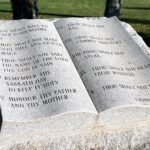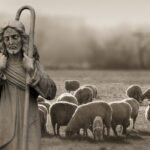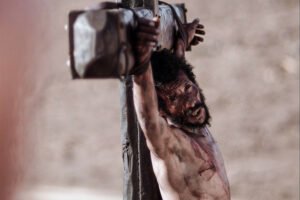EASTER
It was so fun as a little child to wake up early on Easter morning and find a nice large chocolate Easter bunny sitting by my bed. A quick breakfast than we would dash outside to hunt for “Easter eggs”. My Easter basket had many little chocolate bars shaped like eggs and candies sitting in the fake straw and it was soon to be filled with colored hard-boiled eggs. Hunting for the multicolored Easter eggs was full of joviality, mirth and glee. As a family we never went to church at Easter; we just enjoyed the activities. It never occurred to me to consider Easter as anything other than a candyland of excitement about Jesus being alive. There was something about Jesus rising from the dead, but why and where did all the yearly traditions come from? Eventually I grew up and could read what the Bible and history had to say about Easter. I was shocked by what I did not find in the Bible and by what I did find in history about Easter. In looking further, I wondered what God had to say about celebrating days that are not His days. I was a budding young biblical historian looking for facts.
What God has to say about adding to His worship.
God is explicit in telling His people NOT to mingle with and add pagan religion and culture to the worship of the true God. God said, “You shall not add to the word which I command you, nor take from it, that you may keep the commandments of the Lord your God which I command you.” (Deut. 4:2 NKJV). As God’s children we are told by God to keep His commandments and not any other man-made days. “When the Lord your God cuts off from before you the nations which you go to dispossess, and you displace them and dwell in their land, take heed to yourself that you are not ensnared to follow them, after they are destroyed from before you, and that you do not inquire after their gods, saying, ‘How did these nations serve their gods? I also will do likewise.’ You shall not worship the Lord your God in that way; for every abomination to the Lord which He hates they have done to their gods; for they burn even their sons and daughters in the fire to their gods. “Whatever I command you, be careful to observe it; you shall not add to it nor take away from it.” (Deut.12:30-32). Do not follow their ways, do not inquire after their gods, do not worship God as the heathen do. This cannot be more clearly stated.
We are to honor and obey God above all else and only God has the authority to decide what is right and wrong. We are to keep God’s days, not man’s (Deut. 4:13-14). We are not to add or mix in our days of worship with God’s days (Pro. 30:6). We must not preach another gospel (II Cor. 11:3-4). Those who do preach another gospel are “false prophets” and are in league with Satan himself (II Cor.11:13-15.) If we preach and teach “another gospel” we are accursed (Gal. 1:6-8). Christians are not to go back to their prior pagan doctrines, the “weak and beggarly” elements of man’s false pagan religions (Gal. 4:8-11). We must remove ourselves from the traditions of men (Col. 2:8). God’s Holy Spirit is to lead us; we are not to follow the lead of natural man (I Cor. 2:12-14). We should not be unequally yoked together with unbelievers (II Cor. 6:14-18). Do not worship God in vain (Matt. 15:9 and Mark 7:7). We are to worship God in spirit and truth (John 4:23-24). We are not to imitate evil (III John 11). We are not to follow the doctrines of Balaam (Rev 2:14).
What history has to say about Easter.
According to history, Easter with its concept of a risen man and a mother of God caring for him was born in great antiquity several thousand years before the birth of Christ. Fertility rites with bunnies and eggs, the early morning “Easter” sunrise service while looking to the east are all practices much older than Christianity. The celebration of Easter is a practice handed down and absorbed from ancient pagan religions by the Western “Christian” church of the second and through the fourth centuries. Ancient “goddesses of Sumerian, Babylon, Assyrian, Egyptian, Greek and Rome and others portraying the mother of God with a risen son relationship were celebrated for most of 3,000 years BEFORE the birth of Christ.
“Easter. From Eostre, a Saxon goddess celebrated at the spring equinox.”[1] We start our journey into history with a book about the Bible. The Oxford Companion to the Bible starts out its history on Easter with the fact Easter was taken from a “Saxon goddess” and was not originally Chrisitan. Continuing with the 11th edition of the Encyclopedia Brittanica we can look more deeply into the origins of Easter. “The name Easter (Ger. Ostern), like the names of the days of the week, is a survival from the old Teutonic mythology. According to Bede (De Temp. Rat. C. xv.) it is derived from Eastre, or Ostara, the Anglo-Saxon goddess of spring, to whom the month answering to our April, and called Eostur-monath, was dedicated.”[2]
Springing from the world of mythology we see Easter as observed today far predated the early first century Church of God. “The holiday comes in the early spring and is clearly related to ancient fertility myths of reborn heroes who sometimes take the form of grain, as in the case of the Egyptian Osiris…For many, Easter is synonymous with fertility symbols such as the Easter Rabbit, Easter eggs, and the Easter lily…A more generally accepted theory is that Easter comes from the German Ostern, which comes from the Norse Eostur for spring.”[3] The word Easter is not of Christian but of pagan origin. The historian Will Durant has this to say about religions of the pre-Christ era. “Almost everywhere the earth was the Great Mother…Ishtar and Cybele, Demeter and Ceres, Aphrodite and Venus and Freya—these are comparatively late forms of the ancient goddess of the earth, whose fertility constituted the bounty of the fields; their birth and marriage, their death and triumphant resurrection were conceived as the symbols of causes of sprouting and decay and the vernal renewal of all vegetation.”[4] Durant is pointing out the ancient God’s were fertility Gods and we have simply inherited their worship of the past.
Who was Astarte and who were all these other fertility Gods? The queen of the earth, the original mother goddess, went by many names over the millennia. “Astarte: This important goddess in ancient Canaan was called Ashtoreth in Hebrew and was possibly identical to the goddess named Anath. Like the Sumerian/Babylonian Inanna/Ishtar, with whom Anath has connections Astarte is the ‘Queen of Heaven.’ It was said that she was either the child of Asherah, like Anath, or simply an aspect of Asherah.”[5] She was El’s wife and the mother of the God’s. Astarte was absorbed and became a part of the ancient heathen pagan child sacrificing religions in Babylon, Assyria, Greece, Egypt, Rome and dozens of other early heathen nations.[6] El is the equivalent to the ancient Baal of the Bible. Easter has descended down from Baal and Astarte and was woven into the Church against the will of God.
“The Phoenicians, like the Assyrians, had their goddesses. Astoreth, or Astarte, represented the great female productive principle, as Baal did the male. It was originally a name for the energy of God, on a par with Baal. In one of her aspects, she represented the moon; but more commonly she was the representative of the female principle in nature, and was connected more of less with voluptuous rites, –the equivalent of Aphrodite, or Venus.”[7] Astarte was the God of illicit sex which Christianity and ancient Israel were warned against by God. (Acts 15:29; Deut. 12:30-32). By keeping Easter, one is honoring the great mother God of the earth, Astarte.
Who was Egypt worshipping when Israel was rescued from Egypt? As a polytheistic culture, Egypt had many Gods. “Ultimately, the Egyptian cult of immortality was centered in the worship of a specific god, Osiris, who was identified with the Nile. His sister, Isis, whom he married, was identified with earth and fertility.”[8] These are the same Gods that have come down to our time and are known in the practice of Easter. Consequently, Easter is a descendant of what God took Israel out of at the great exodus from Egypt. Christians are to flee from sin, not embrace it.
The pagans of the past did not transform to being Christians. The Christians of the past transformed themselves into paganism and simply renamed the old rites with Christian names. “…how much more faithful are the heathen to their religion, who take special care to adopt no solemnity from the Christians.”[9] According to Brittanica, “There is no indication of the observance of the Easter festival in the New Testament, or in the writings of the apostolic Fathers.”[10] “The early Church of God did not keep this festival and in fact held Passover to the 14th of the first month on the Hebrew calendar and “neither the Lord nor his apostle enjoined the keeping of this [Easter] or any other festival.”[11] Not until 325 A.D. when the Emperor Constantine summoned the church elders to Nicaea for a conference was Easter settled upon.[12]
History shows us Easter was not a Christian festival. In fact, it is an outgrowth of the ancient pagan customs which Israel (And Christians) have been explicitly told not to emulate in worship. “They forsook the Lord and served Baal and the Ashtoreths. And the anger of the Lord was hot against Israel…” (Judg. 2:13-14a See also: I Sam. 7:3; 12:10; I Kings 11:5; II Kings 23:13). “The Bible makes it clear God’s chosen people did evil in His sight by following customs associated with this abominable, pagan goddess (who does not even really exist).”[13]
Easter was NOT celebrated by the early Christian church; it is not spoken of in the Bible nor written about by the early apostles and church fathers. The use of Easter perpetuated an old usage of a pagan goddess. Over time it replaced the Christian Passover which Jesus had said on His last night of life to “do in remembrance of me.” (Luke 22:19). The first century Church of God kept God’s New Testament Passover as instituted on the last night of the life of Jesus (Matt. 26, Luke 22, Mark 14, John 13;18;19, I Cor.5:7-8; I Cor. 11:17-34). The apostles kept Passover and NOT Easter.
Easter the ancient pagan tradition of fertility worship honoring the goddess of love, sex and fertility with its Mother of God worship had supplanted God’s Passover observance. God said not to do what the pagans did to worship their god’s. See Deut. 4:2, 13-14; 12:30-32; II Cor. 11:13-15; Gal. 1:6-8; 4:9-11; Col. 2:8. Christians are to obey God and are not to observe what the pagans observe. Easter was grafted into Christianity from pagan worship to supplant/replace God’s true Passover service and it is a continuation of ancient pagan fertility rites.
One might ask about the word Easter and if it is even in the Bible? The answer is found only in the King James Version (KJV). It is only used once in all the Bible translations. “And when he had apprehended him, he put him in prison and delivered him to four quaternions of soldiers to keep him; intending after Easter [pascha in Greek] to bring him forth to the people.” Acts 12:4 [KJV]). No other translation uses the word “Easter” in translating this verse. In 1611 the translators purposely mistranslated the Greek word pascha as Easter to placate King James I of England. Strong’s #3957 shows the meaning of the word pascha to be “Passover”. The JFB commentary states, “The word in our King James Version is an ecclesiastical term of later date and ought not to have been employed here.”[14]
Mike Wallace
[1] A.R.C. Leaney, “Easter”, The Oxford Companion to the Bible, Bruce M. Metzger and Michael D. Coogan, (New York: Oxford University Press, 1993),173.
[2] Encyclopedia Britannica, 11th ed. Published 1910, Vol. 8. “Easter”, 828.
[3] David Leeming, The Oxford Companion To World Mythology. “Easter”, (New York: Oxford University Press, 2005), 111.
[4] Will Durant, The Story of Civilization: Our Oriental Heritage, Vol. 1, (New York: Simon and Schuster, 1963), 60.
[5] Leeming, 35.
[6] Leeming, 35.
[7] John Lord, LL.D., Beacon Lights of History: The Old Pagan Civilizations, Vol. 8, (New York: Wm. H. Wise & Co., 1921), 48.
[8] Crane Brinton, John B. Christopher and Robert Lee Wolfe, A History of Civilization: Prehistory to 1715, Vol. 1, second ed. (Englewood Cliffs: Prentice-Hall, Inc.1965), 28.
[9] Alexander Hislop, The Two Babylon’s or The Papal Worship Proved to be The Worship of Nimrod and His Wife. (Neptune: Loizeaux Brothers, 1959), 93.
[10] Brittanica, Vol. 8, 828.
[11] Brittanica, Vol. 8, 828.
[12] Brittanica, Vol. 8, 828.
[13] Joe Kovacs, Shocked By The Bible: The Most Astonishing Facts You’ve Never Been Told. (Nashville: Thomas Nelson Publishing, 2008),26.
[14] Jamieson, Fausset and Brown, Commentary on the Whole Bible. (Grand Rapids: Zondervan Publishing House, 1980), 1099.























